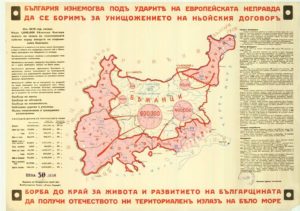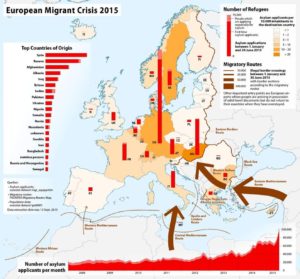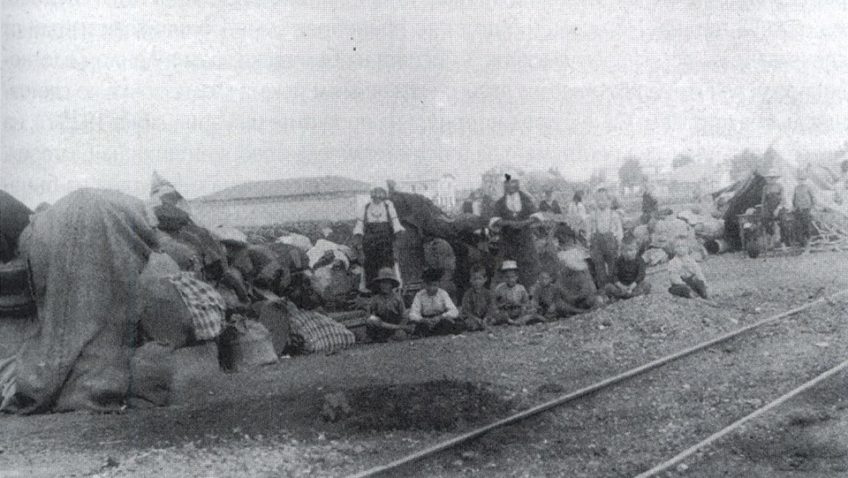As part of the land route into Europe, Bulgaria has been put in the middle of the refugee crisis. This has put much pressure on the Bulgarian government and civil society, caught between international agreements, limited resources, and a population that is highly polarized when it comes to the refugees. During the summer of 2016, I was able to work with refugees in Bulgaria and see the situation up close, including the many flaws and issues of the system, as well as the hope and motivations that the migrants brought in.
One major issue that is central to this topic is the question of identity. As a people, Bulgarians are mostly Eastern Orthodox Christians and the 500 years of Ottoman rule have created scars on the Bulgarian identity pertaining to Islam. This is seen today, as the refugees coming to Bulgaria today are seen through many lenses.Some see them as a mass of people fleeing conflict or in search of a better life, while others, particularly the older generations, see a mass of men coming to reconquer or fundamentally change Bulgaria and Europe.
This can be seen in the narratives used in protests all over Europe. One example would be the following, a protest in the town of Harmanli, where one speaker claimed “They are not welcome because they are different from us, culturally, in civilization, historically, and religiously and they have no intention of joining our society. These people are coming here to try and change us.”
This, of course, does not mean that Bulgarians are completely islamophobic or that the different identities are the main reason many Bulgarians wish to reject the refugees. There is a sizable Muslim population in Bulgaria that lives its life just like their Christian neighbors. But these are Muslims that have been in Bulgaria for many years. The socialist era saw many foreigners from socialist countries all around the world spending time in or studying in Bulgaria as well. In contrast, the refugees are from distant countries and many are completely alien to Bulgaria. They come from countries of conflict, which brings perceived threats into the equation. Some of them would even be foreign in parts of their own countries, as there are migrants that come from isolated mountain towns that are vastly different from major cities in their own countries.

But today’s case is very different. The fear that the migrants are entering Europe for conquest is hardly helped by the fact that the majority of these refugees are single men, but grouping all of them into a singular identity is a major issue. For one, the majority of these men are not going to Europe to fight, but fleeing so they don’t have to fight. Conscription is still used as a practice worldwide, especially in conflicts that have lasted for such a long time that willing recruits are scarce. It does not help that jihadist groups have hidden sleeper cells within refugees, but the exact extent of this is unknown and possibly overblown by the media who sees it as an easy and well-selling story.
A perfect example of the media hype surrounding the refugees is how the Bulgarian media spent days talking about a particular failed terrorist attack in Germany simply because the perpetrator passed through Bulgaria on his way to Germany. While the media focused on the fact that the man could have easily committed a terrorist attack in Bulgaria, they ignored the obvious; he could have easily committed a terrorist attack in Bulgaria. He had humanitarian status in Bulgaria, where he could have easily stayed and plotted an attack. Instead he took the risk of illegally going to Germany, where his plan was ill-conceived and poorly carried out. This is not to diminish the risks of terrorism, but to point out that Bulgaria is not a valuable target for Islamic terrorism.
Another major issue with the belief of a coordinated effort to somehow undermine Europe is ignorant of how refugees see each other. Within one camp in particular, the tensions were very present. Families were housed separately from the single men, and women in the family’s section often felt uncomfortable leaving their quarters because it would mean walking by large groups of men that would try and talk to them, or simply oogle and catcall them. Because of how refugees were divided in this particular camp, the families were mostly Kurdish, while the single men were mostly Afghans. Over time, this division resulted in strict segregation between the two groups that would occasionally turn violent. It would usually be nothing more than minor scuffles, but open violence along ethnic lines occurred as well. There was much tension inside ethnic groups themselves.
With all that I noticed, it is difficult to see how the large mass of single, unarmed men coming in are coming as conquerors. However, this narrative still holds sway and has been used by many, from the paramilitary groups mentioned previously to the church.
At worst, the refugee crisis presents a major issue in terms of changing demographics, and this is something that the far right is unquestionably right about. But while many see this as a threat to the ethnic purity of Bulgaria and Europe, they ignore the fact that many countries in the West are growing older, and Bulgaria is no exception. In fact, of all Eastern and Central European states, Bulgaria is expected to lose the highest proportion of per capita population by 2050. A wave of young and capable refugees can help Bulgaria with the major population change that it has suffered over the last few decades.
This brings another major issue that must be brought up when looking at the refugee crisis and Bulgaria; a large percentage of Bulgarians are economic migrants. The exact numbers are hard to determine, but “official statistics of the Bulgarian Foreign Ministry show at least 3 million Bulgarians live abroad” which would mean that around a quarter of the Bulgarian population lives outside of Bulgaria. In fact, today’s media focus on the refugee crisis is similar to the media hype around a possible mass immigration from Bulgaria and Romania into the UK, where migrants would allegedly destroy UK society.
There is one key difference, which is that the majority of Bulgarians living abroad are doing so legally instead of crossing borders through holes and ships. However, the legality of how they flee means nothing to the refugees, particularly the ones that are fleeing from conflicts. For them, what matters is their safety and prosperity, not the legality of how they attain it. This brings another comparison to mind, when Albanians decided to leave in mass as well in 1991. They also used crowded boats that were way beyond their safety limit.
The influx of refugees has also helped build up the far right in Bulgaria over the past few years, in the form of vigilante migrant hunters along the border, organized paramilitary organizations, and a far right, nationalist political coalition with much potential in the upcoming parliamentary elections. Random violent acts are often committed against refugees . In other cases, it is the police themselves who are responsible for violence against refugees, pushing some back into Turkey to prevent them from entering Bulgaria or stealing from them and leaving them stranded in the middle of nowhere.


On the other side are the pro-migrant groups, which have been able to do good but lack the wide grassroots support that the far right has been able to conjure. Nonetheless, they still have some sort of power because of Bulgaria’s obligations to UN/EU treaties spawned from the current refugee crisis and before. Funding from the EU and UNHCR has given life to NGOs as well as the State Agency for Refugees, but both are still under strain because of how many refugees are coming into the country compared to the resources that Bulgaria has to accommodate them.
I could continue listing the violence that has occurred as a result of the refugee crisis because it is interesting. However, what is more important but less newsworthy is the good that was also observed in the refugee camps; the sincerest ‘thank you’s that I have ever gotten, being invited over for dinner by families who I could barely communicate with, or children that had so little yet gave me candies and refused to take no for an answer.
Regardless of whether they are accepted, the refugees will still keep coming.


0 comments